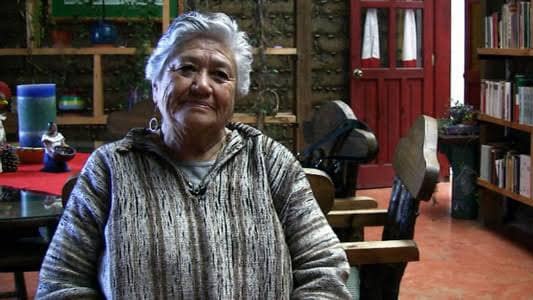
by Elio Henríquez
San Cristobal De Las Casas, Chis. – Anthropologist and social activist Mercedes Olivera Bustamante, one of the pioneers of feminism in Chiapas, died yesterday at the age of 87, reported Guadalupe Cárdenas Zitle, coordinator of the feminist collective that bears the academic’s name.
A participant in social movements since the 1970s, she not only excelled in the field of research, but also for her activism and her work with indigenous women, in migration, human rights, labor rights and sexuality, which led her to found different groups and collectives. She supported the Zapatista struggle.
Leader of the Academic Body of Gender and Feminism Studies of the Center for the Study of Mexico and Central America, under the University of Sciences and Arts of Chiapas (Unicach) and PhD in Anthropology from the National Autonomous University of Mexico (UNAM), Mercedes Olivera published anthologies and authored several publications on feminism, including the one that is recognized in Chiapas as the first research on this topic in the state.
Consistent with her activism, in 2018 she renounced an honorary doctorate after the Unicach, which awarded it to her in 2012, announced that it would be given to the then head of the Secretariat of National Defense, Salvador Cienfuegos.
That same year, the Latin American Council of Social Sciences (Clacso) awarded her the Clacso Prize in Buenos Aires, Argentina, and the following year she edited the anthology Mercedes Olivera: Popular Feminism and Revolution. Between Militancy and Anthropology.
“It is a discourse of constant vindication of rights ranging from the autonomy of indigenous peoples to the liberation of women,” said researcher Monserrat Bosch Heras.
“I met Mercedes during the height of the Central American revolutionary movements, of which she was an active participant through her militancy in the Guatemalan guerrilla process,” although she gradually distanced herself from them for not not adopting feminist principles, after which she embraced the Zapatista cause,” Bosch recalled in the anthology.
She also stressed that, “unlike many people, age and the passing of the years did not moderate the strength of her passion for the achievement of a better world, an inclusive world beating with a heart from ‘below and to the left’, as Zapatismo demands.”
Originally from Mexico City, Mercedes arrived in Chiapas in 1970; in San Cristobal de Las Casas, she founded the Center for Research and Action of Latin American Women (CIAM), the Mercedes Olivera Feminist Collective (Cofemo) and the Center for Women’s Rights of Chiapas (Cdmch). She was also a professor at the Faculty of Social Sciences of the Autonomous University of Chiapas (Unach).
After announcing her death, the Fray Bartolomé de las Casas Human Rights Center expressed that she was “tireless in the struggle and defense of women’s rights and the autonomy of the people. She leaves her mark and legacy in those of us who walked with her. May she rest in peace”.
For its part, Clacso, shared on social networks: “Her immense feminist and revolutionary legacy will accompany us in our present and future struggles”.
“We woke up to the news that Mercedes passed away. It is a very sorrowful loss for feminists in Chiapas because she was our teacher for so many years,” expressed Guadalupe Cárdenas Zitle, coordinator of Cofemo.
“It is very sad news, although at the same time it gives me peace of mind to know that she is now resting because her health was bad; she was fighting for years against cancer and a series of complications; her body already needed to rest,” she added.
She emphasized that Mercedes, “despite all her health complications, never stopped her work, reflecting and analyzing the problems of women in Chiapas. Her legacy is enormous, she always enlightened us and gave us a lot of guidance on where to walk to achieve that dignified life for women, until her last day.”
She said that the anthropologist and social fighter, who would be 88 years old on September 30, “was a tireless and admirable woman. Feminism in Chiapas was strengthened thanks to her.
Dora Hernández Gómez, “radical feminist of the independent left” and companion “of many struggles since 1990” of Mercedes, announced that she passed away at six o’clock in the morning at her home, located in San Cristóbal de las Casas, where she was accompanied by her children and other family members.
“She is an extraordinary woman who is transcendent as a feminist, revolutionary, humanist, and as an integral person in her vision of the women’s struggle. She synthesizes all the efforts of women because she not only defines herself as a feminist but also as a radical left-wing feminist, a definition that is very particular to her,” he said.
She maintained that Olivera “can be defined as a revolutionary of the century and of the millennium. That is how we have understood it. Her legacy is universal. She has left tracks and sown seeds in the five continents, across several generations.”
She asserted that “she is not only a feminist activist, but a scientist with a significance that makes a difference because with her theory, her practice and her exercise of women’s rights she has taught us, she has educated future generations that are just beginning to be glimpsed.”
Cárdenas Zitle pondered: “There is an immense seedbed having to do with her theory and political positioning, her formation, her way of understanding feminism as an anti-systemic struggle.
“That is, it is not the struggle for the happiness of women, but to transform humanity completely in relation to the capitalist, neoliberal, patriarchal and predatory system that is destroying humanity.”
She recalled that Mercedes Olivera “said that feminism has to achieve the autonomy and self-determination of women; if it is not so, it is not complete.”
This article was published in La Jornada on August 8th, 2022. https://www.jornada.com.mx/notas/2022/08/08/estados/fallecio-la-antropologa-y-activista-social-mercedes-olivera-bustamante/ English interpretation re-posted by Schools for Chiapas
